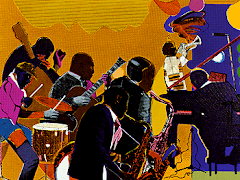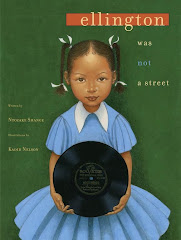 |
| National Student Poet, Sojourner Ahebee |
About a month ago I had the chance to reconnect with old memories. How, you ask? Alzheimer’s poetry workshop, I say. On a cold February afternoon, the time of year the snow takes over in Northern Michigan, the time of year you stop believing in magic, Mickayla Noel and Eleanor Rudnitsky-Brown, my fellow writers, and I visited a nursing home ten minutes away from my school to facilitate a poetry workshop with the residents. On our ride to the home, all of our stomachs were bursting with butterflies. We were going into unknown territory, and that scared us.
When we arrived, some of the residents were already situated in the common area, with the February light pouring into the room as I and my group members unpacked our poems. Some of the residents were being pushed in on wheel chairs as well, their faces searching our eyes like you would a stranger. I then proceeded to walk into the middle of the room and introduce myself. We then went around the room and asked the residents to say their names for us. A woman on the far right in a blue pullover told us her name was Irene. I responded with “that’s a beautiful name. I have a friend named Irene.” Her smile illuminated the very room we stood in. As we continued around the room with introductions, it was evident that these residents were in different stages of the disease. The early-stage patients were able to make eye contact and respond to questions quite quickly. Some of the later-stage patients had their heads down to the point that I couldn't even see their eyes. One woman in particular had her head drooping into her lap, but when I went over and held her hand while asking her name, she focused her eyes on me and smiled, whispering her name softly.
I started the workshop with Billy Collins’ poem entitled “Forgetfulness”. This involved a call-and-response technique. I would read a line of the poem and then ask the residents to repeat the line back as a means for them to both play with language and to exercise memory. This exercise got off to a rocky start. The residents were shy and had trouble jumping in. But, as we progressed through the poem and they became more familiar with their poetic voices, they were more readily able to feed the lines back to me. In no time the residents were reciting not only the Collins' poem but the poems of Robert Hayden and Wilfred Owen . Some did so quietly in hushed whispers, while others filled the room loudly with the words of these poets.
This experience was so powerful. Not only because of the memory aspect, but because we were working together to uncover language, to uncover narrative, and most importantly, to uncover the power of the human voice. This was an exchange in which both the residents and my group and I were making a conscious attempt to understand each other.
 After the reading and reciting about five poems, my group and I moved on to our final exercise: the writing of a collaborative poem. I assigned Mickayla the job of being the scribe for this exercise. When we were ready to start, Mickayla collected her huge white pad and sharpie and proceeded to position herself in the middle of the common room so she could better listen to what the residents would have to say. I then explained to the patients that we were going to attempt to write a “Where I’m From” poem. The task appeared daunting at first, but they went along. I started with simple questions like “where was your first home?” and “what was your hometown known for?” As the dialogue progressed, together we began to uncover the history and narratives that the residents had carried with them for quite some time. As we went along, they told me the names of their childhood dogs, their favorite plants, family traditions, people they were very close to, lovers, their favorite meals as children etc. As the residents took turns answering the questions, Mickayla, the scribe, would write all of the details down onto the pad where the poem was growing into this magnificent living thing. Soon everyone was engaged in discussion with each other, and there was no stopping. It almost felt as if time didn’t matter. This was more than the making of a poem. This was memory emanating from our very mouths.
After the reading and reciting about five poems, my group and I moved on to our final exercise: the writing of a collaborative poem. I assigned Mickayla the job of being the scribe for this exercise. When we were ready to start, Mickayla collected her huge white pad and sharpie and proceeded to position herself in the middle of the common room so she could better listen to what the residents would have to say. I then explained to the patients that we were going to attempt to write a “Where I’m From” poem. The task appeared daunting at first, but they went along. I started with simple questions like “where was your first home?” and “what was your hometown known for?” As the dialogue progressed, together we began to uncover the history and narratives that the residents had carried with them for quite some time. As we went along, they told me the names of their childhood dogs, their favorite plants, family traditions, people they were very close to, lovers, their favorite meals as children etc. As the residents took turns answering the questions, Mickayla, the scribe, would write all of the details down onto the pad where the poem was growing into this magnificent living thing. Soon everyone was engaged in discussion with each other, and there was no stopping. It almost felt as if time didn’t matter. This was more than the making of a poem. This was memory emanating from our very mouths.
My short time spent at the nursing home was special because the residents were makers, they were poets for a quick hour. As they shouted bits of Dickinson through the air, or gave me sensory details about the interiors of their homes, I was forced to think of my grandmother, who, too, was afflicted with Alzheimer's. I was forced to remember the resilience in her wrinkles as she recited Langston Hughes on her death bed. All I could do was smile as the residents learned to take control of their world with the power of words. I know my grandmother would be proud, and because of that, I can’t ask for anything more.
 |
| Left to Right: Mickayla, Eleanor, and Sojourner |
But you might ask, why poetry? What can poems do for the forgetful? Well, poets and doctors alike are starting to make connections between poetry, memory, and the human mind. Apparently a special part of your brain lights up when you encounter a poem, especially one you have encountered before. While creating my proposal for this very workshop, I purposely included poems that the residents may have come upon while in school or during their youth so the workshop would really engage them on a memory level. A big shout out goes to Gary Glazner and the Alzheimer’s Poetry Project for providing me with workshop techniques and much needed insight on the Alzheimer’s disease itself. Also, a huge thank you to the National Student Poets Program for helping me make this project a reality, Suwan Kim for documenting this project with her gorgeous photography, as well as the nursing home that hosted us.
I came into the nursing home expecting to change the residents, but in the end they really changed me. They allowed me to see the significance language can play in our lives at different stages of life, and for that, I thank them with all my heart.

























No comments:
Post a Comment